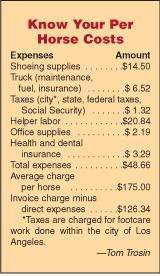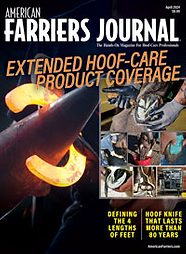After 22 years of shoeing, Tom Trosin maintains he's made almost all of the mistakes a farrier could possibly make in running a business. The Moorpark, Calif., shoer hopes that his experiences can help you avoid many costly errors. Here are some of the things he's learned:
- To succeed in the footcare business, you've got to be disciplined, especially in the credit area. Debt in both your footcare business and your personal life should be avoided.
- Hire an accountant. Get good financial advice now, for the future and for retirement.
- Maintain a savings account with at least a 3-month reserve.
- Don't buy something you can't afford and don't really need. "As an example, many young farriers start with the purchase of a $30,000 rig that they can't afford," he says.
- Maintain separate checking accounts for your hoof-care business and family expenses.
- Avoid finance and interest charges at all cost. "With a significant amount of credit card debt, finance charges can be anywhere from $2,500 to $3,000 per year on just an $8,000 balance," he says. "So instead of having an $8,000 debt, all of a sudden you may owe over $11,000. And being late with the payment on just one card may lead to a higher interest rate on all your cards."
- Avoid high credit ceilings. "If you have a credit card with a limit of over $5,000, cut it up," says Trosin. "There's no reason to need a credit limit over $2,500. You don't need it in the shoeing business or your personal life."
- Check your credit score online at least once a year at ExpediaDirect.com or at one of the many other Web sites that offer this free service. Sometimes it seems like the worse your credit rating is, the more credit cards you can get.
- Have your shoeing schedule properly organized to work more effectively.
- Shoers should aim to do 5 or 6 horses in a normal day - not 8 or 10 horses a day. "Develop the needed skills and efficiencies so you can charge more per horse and only have to do a half-dozen horses in a typical day," says Trosin.
-
Know how much money you are earning from each horse. "Just because you spend $450 a week on shoeing supplies isn't good enough," says Trosin. "Know exactly how much of this bill on average goes for each horse."
Since Trosin spends an average of 1 hour trimming and nailing on 4 keg shoes, this earns him an hourly gross wage of $126.34. Based on the federal minimum wage of $6.55 per hour, this represents the equivalent of 19.3 hours of minimum wage work. (See accompanying chart for details.) - Don't wear out your body and prepare properly for retirement. "Some farriers who shod 8 horses daily in their prime years of work now only do 3 horses per day," he says. "I don't want to have to shoe 10 horses per day when I am 57 just to get by."
- Start contributing at a young age to a retirement account, such as a Roth IRA or a 401K. You can't afford to wait until you're older to start investing for retirement.
- Protect yourself with health and dental insurance. "If you don't, you're playing with fire," he says. "When I was 23, I got seriously injured and it cost me lots of money. You also need dental insurance in case you get kicked in the face by a horse or end up with a serious root canal problem."
- Sign up for disability insurance. Trosin says it's not a question of whether a shoer will get hurt, but only a question of when. If you can't get under a horse, you won't have any shoeing income.
- Continue to learn new skills and ways to improve your footcare work and business efficiencies. "Learn more so you can charge more," he maintains. "Use the development of new skills through more learning to make both your hoof-care work and your life easier."
-
Don't be afraid to ask talented shoers in the industry for help and advice. "A client's respect for you will grow when you tell them that you don't have all the answers, but will get them," says Trosin. "When you have a problem that you don't know how to handle, tell the client that you'll make some phone calls and be back with some solutions.
"The day you don't have someone who you look up to when you have a concern or need advice from is a day that you have serious problems." - Help other hoof-care professionals. "If someone has a concern and will work with me a couple of days a month, I'll try and help them figure out why they are losing horses and clients," Trosin says.
- Find the time to learn needed forging skills. Even though you may mainly use keg shoes in your work, it's important to fully understand the reasons behind various forging options.
- Build up the image of other shoers and don't run down the work of other farriers to horse owners, trainers or equine vets. Help build the pride of other shoers and the footcare profession.










Post a comment
Report Abusive Comment